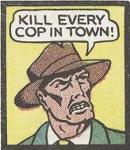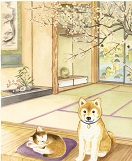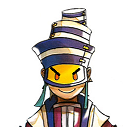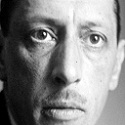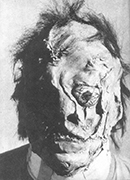|
Mishima is dope as gently caress but do Spring Snow and Runaway Horses before confessions of a mask Also, if you liked Snow Country, Thousand Cranes and Beauty and Sadness are both also very good Kawabata.
|
|
|
|

|
| # ? May 10, 2024 20:09 |
|
Ventadour posted:Poland. Haruki Murakami aside, Japanese authors don't seem to sell well over here, so my options are usually limited to digging through libraries and second-hand stores for things published decades ago, or English translations. Even my university library's Japanese lit section is very small and is majorly made up of English, German or Russian translations. If you speak French, the possibilities really open up The French friggin love the Japanese
|
|
|
|
Yeah right, three only people that the French love is the French
|
|
|
|
blue squares posted:Yeah right, three only people that the French love is the French There are only two French people, La Résistance et Les Vichy.
|
|
|
|
I think the only jap lit I've read was Kitchen. It was OK. Author has a great name, Banana Yoshimoto.
|
|
|
|
Ventadour posted:Hi TBB, I've been reading through this thread and saw some cool & good recs so I thought I'd try asking too. Mishima is the anti-Oe, and very much grim and pessimistic, so that might not be what you're looking for. If you read The Silent Cry by Oe it might be fun to read Murakami's Pinball 1973 (in Japanese the titles are very similar, Pinball is supposed to be a loose commentary on Silent Cry). Akutagawa is good and more melancholy than grim, at least most of the time.
|
|
|
|
Romaine Gary (Promise at Dawn) and Josef Škvorecky (The Engineer of Human Souls, but it's a brick, so maybe Bass Saxophone?) manage to talk about big, often painful issues in a straightforward manner without getting too grim. I don't really see a common thread between the authors you listed tho...
|
|
|
|
I am about to finish Pale Fire and so far this has been one of the most amusing books I've ever read, although the way the narrative weaves together leaves a lot to wonder about.
|
|
|
|
Heath posted:I am about to finish Pale Fire and so far this has been one of the most amusing books I've ever read, although the way the narrative weaves together leaves a lot to wonder about. Pale Fire is the book that really got me into Nabokov, and its still my favorite of his. Lolita does the unreliable narrator thing as well, but Kinbote is just so weird and likeable even if he's a horrible rear end in a top hat
|
|
|
|
He doesn't even strike me as that much of an rear end in a top hat, just intensely sad and lonely. Of course I'm still not sure exactly what parts of his story "really" happened in the first place.
|
|
|
|
Shibawanko posted:Mishima is the anti-Oe, and very much grim and pessimistic, so that might not be what you're looking for. If you read The Silent Cry by Oe it might be fun to read Murakami's Pinball 1973 (in Japanese the titles are very similar, Pinball is supposed to be a loose commentary on Silent Cry). Akutagawa is good and more melancholy than grim, at least most of the time. I'm sorry you're not man enough to sacrifice yourself to the emperor
|
|
|
|
Legit can we agree Mishima has the best death of any author pretty much ever
|
|
|
|
Mel Mudkiper posted:Legit can we agree Mishima has the best death of any author pretty much ever it was a good death for a fascist to have in a failed coup
|
|
|
|
Smoking Crow posted:I'm sorry you're not man enough to sacrifice yourself to the emperor I mean, I love Mishima, but it doesn't sound like that's what he's looking for.
|
|
|
|
Maybe it'd help if you didn't reflexively go into oneupsmanship and ignore what he really asked for???
|
|
|
|
Shibawanko posted:I mean, I love Mishima, but it doesn't sound like that's what he's looking for. I don't think the Mishima recommendation was necessarily because he is the stylistic equal of Oe. I think to understand some of Oe's perspectives on Japanese culture it helps to read an author who is reflective of the same social forces Oe rejects. I mean, Mishima as an author creates an interesting contrast to the kind of perspective we see here http://www.nytimes.com/1995/05/07/magazine/the-day-the-emperor-spoke-in-a-human-voice.html EDIT: For example, if someone said they liked Hemingway and Faulkner I might recommend Fitzgerald. Fitzgerald is nothing like those two, but reading him helps but the other two authors into a better context. V this too V Mel Mudkiper fucked around with this message at 15:54 on Jul 26, 2015 |
|
|
|
mishima ownsa nd everyone should read him at least once
|
|
|
|
Mel Mudkiper posted:I don't think the Mishima recommendation was necessarily because he is the stylistic equal of Oe. I think to understand some of Oe's perspectives on Japanese culture it helps to read an author who is reflective of the same social forces Oe rejects. He's kind of the opposite of Oe though. Oe is an old man who struggles with the acceptance of finitude, aging, and death, Mishima is all about eternal youth and eternity (and about coming to accept a grisly end in the search of it). Sure, he's interesting to read if you like Oe, but only if you want something completely opposed to Oe. I like both, but if you don't want pessimism, Mishima is not what you're looking for.
|
|
|
|
Shibawanko posted:but only if you want something completely opposed to Oe. I like both, but if you don't want pessimism, Mishima is not what you're looking for. I do not think Mishima is so much pessimistic as he is obsessed with palingenesis EDIT: For example, I do not think Sea of Fertility is so much a pessimistic view of Japan over the 20th century as much as the themes suggest a need for constant destruction and rebirth. Mishima clearly saw age as toxic and idealized the destruction of it in favor of youth. Mel Mudkiper fucked around with this message at 16:00 on Jul 26, 2015 |
|
|
|
Mel Mudkiper posted:I do not think Mishima is so much pessimistic as he is obsessed with palingenesis What about the end of Decay of the Angel though? He straight up says how much he despises modernity and how "Japan has become ugly" and so on. The whole final novel is about a false reincarnation which is false exactly by acting out the bloodthirsty ideals from Confessions of a Mask. All of the other novels by Mishima suggest renewal and destruction, but I think in the end he saw himself as similar to Toru and unworthy, with self destruction as the only honorable way out. I actually think for that reason it's interesting to read Toru as a sympathetic character, because he couldn't.
|
|
|
|
Shibawanko posted:What about the end of Decay of the Angel though? He straight up says how much he despises modernity and how "Japan has become ugly" and so on. The whole final novel is about a false reincarnation which is false exactly by acting out the bloodthirsty ideals from Confessions of a Mask. All of the other novels by Mishima suggest renewal and destruction, but I think in the end he saw himself as similar to Toru and unworthy, with self destruction as the only honorable way out. I actually think for that reason it's interesting to read Toru as a sympathetic character, because he couldn't. That's the very basis of Palingenesis though. Things that simply survive and do not become reborn into their original values become ugly and decadent. Its the core of the Fascist philosophy he was a part of. Note, he says Japan has become ugly. He doesn't call for its extermination though, he calls for its rebirth. For him, death is a form of rebirth instead of destruction. He doesn't call for Japan to be ended, but for the tenets of Japan as a progressive nation to be annihilated so that it might return to its purer earlier form. Note that in the first three books the reincarnated soul stays beautiful and pure simply because it dies young. What makes the final reincarnation ugly and worthless is that it survives and clings to its ugly broken life rather than accept death gracefully. You can see this also being a major theme in Temple of Dawn. Remember the hypothetical utopia in which all people kill themselves while they are still young and beautiful rather than see themselves decay with age? Keep in mind, the day he sent Decay of the Angel to his publisher was the day he died. He didn't kill himself trying to destroy Japan. He was trying to return to Japan to what he had imagined were its fundamental values that they had lost during the 20th century. He did not hate Japan, he hated that Japan progressed instead of reverted.
|
|
|
|
Ventadour posted:Hi TBB, I've been reading through this thread and saw some cool & good recs so I thought I'd try asking too. ryu murakami (he's not the one your thinking of) kenzaburo oe osuma dazai's fairytail book is not depressing compared to his other works kobe abe Witold Gombrowicz (there is no way for him not to be there!) checkov kafka Dezső Kosztolányi carlos fuentes Stravinsky fucked around with this message at 17:05 on Jul 26, 2015 |
|
|
|
Stravinsky posted:ryu murakami (he's not the one your thinking of) some of these recommendations do not seem to match the bill of "not overly grim and pessimistic" imo
|
|
|
|
I'm going off of the fact that Dostoyevsky is not grim and depressing. Kafka, while grim is really funny.
|
|
|
|
Mel Mudkiper posted:That's the very basis of Palingenesis though. Things that simply survive and do not become reborn into their original values become ugly and decadent. Its the core of the Fascist philosophy he was a part of. Well the Land of the Pomegranate wasn't exactly like that, it was a place where young people were sacrificed to sustain the pleasure of immortal (but ugly) spectators. That whole description was supposed to be a characterization of Imanishi and, I think, Mishima's own earlier worldview. In Confessions of a Mask he still openly fantasizes about the body of the dancing guy covered in blood (and this was written when he was still an intellectual in Todai, physically weak). Decay of the Angel isn't supposed to glorify death and renewal, but the failure, or at least the unattainability of Mishima's own earlier views. I think he was disgusted with himself, realized that his own fantasies about rebirth and renewal were petty conservative illusions that would lead to the same kind of phony ugliness that he saw in others, and that a kind of suicide that blended fantasy with reality was the only answer. There's also a bit of historical irony about his suicide in that his final speech he especially deplored the LDP for its policy of demilitarization at the behest of the US, while it's the same LDP that's now pushing for remilitarization, in the interest of the same US, using the kind of nationalist rhetoric that Mishima himself would have used.
|
|
|
|
Shibawanko posted:I think he was disgusted with himself, realized that his own fantasies about rebirth and renewal were petty conservative illusions that would lead to the same kind of phony ugliness that he saw in others, and that a kind of suicide that blended fantasy with reality was the only answer. If he was disgusted and realized his ideals were illusions why did he immediately commit an elaborate act of suicide in defense of those same illusions?
|
|
|
|
Mel Mudkiper posted:If he was disgusted and realized his ideals were illusions why did he immediately commit an elaborate act of suicide in defense of those same illusions? I mean have you ever read anything about his life? He was deeply insecure, not at all seeing himself as the embodiment of what he want he wanted to be. He wanted to die for that reason alone. He was a fascist, but a purely aesthetic fascist, and his suicide was a piece of theatre. He was committed to a purely aestheticized ideal while simultaneously realizing the limitations of that same ideal. The Japan of the renewal which he wanted never existed (read the parts where he actually describes Tokugawa Japan, they're ridiculous, they're about guys who don't want to walk underneath electricity pylons because they symbolize modernity), he himself was a worshipper of western literature. He was serious about fascism while also enacting its destruction figured by his own self-destruction. So it was not at all a straightforward defense. There's a passage in Sun and Steel which explains it in more detail but I can't find it now.
|
|
|
|
Shibawanko posted:I mean have you ever read anything about his life? He was deeply insecure, not at all seeing himself as the embodiment of what he want he wanted to be. He wanted to die for that reason alone. He was a fascist, but a purely aesthetic fascist, and his suicide was a piece of theatre. He was committed to a purely aestheticized ideal while simultaneously realizing the limitations of that same ideal. I think we agree on the type of person Mishima was, just not what his final actions represented about the kind of person he was. Of course his suicide was theatre, but the purpose of the final act was to strip him of his own insecurities and to embody the virtues that he felt he never truly had. He saw himself as a poor embodiment of the Samurai, but what better to prove to yourself the sincerity of your beliefs than by acting fully upon them. He decided to die as a samurai to finally enforce for himself that he was one.
|
|
|
|
Mel Mudkiper posted:I think we agree on the type of person Mishima was, just not what his final actions represented about the kind of person he was. Right but from the way his later writing changed (particularly the idea of a false incarnate), I didn't get the impression that he really believed that the suicide would bridge the gap, so to speak, between what he was and what he thought he ought to be. I think it was an act of despair, most of his more cruel, sadomasochistic characters are increasingly mockeries of this ideal. Mishima clearly hated the character of Toru, but there are clear parallels between Toru and the boy gang from The Sailor who fell from Grace, for instance, who in turn are already a bit too comically misanthropic to be straightforward fascist idealists, indicating a shift in his thinking about glory equalling death. I really don't believe that he believed that if he killed himself, it would solidify him as a kind of samurai character or anything like that. It was meant as a much more empty, useless act than that. If you kill yourself because you believe that it will make you great, that's basically a very optimistic idea. I really don't believe that that's why he did it.
|
|
|
|
Shibawanko posted:Right but from the way his later writing changed (particularly the idea of a false incarnate), I didn't get the impression that he really believed that the suicide would bridge the gap, so to speak, between what he was and what he thought he ought to be. I think it was an act of despair, most of his more cruel, sadomasochistic characters are increasingly mockeries of this ideal. Mishima clearly hated the character of Toru, but there are clear parallels between Toru and the boy gang from The Sailor who fell from Grace, for instance, who in turn are already a bit too comically misanthropic to be straightforward fascist idealists, indicating a shift in his thinking about glory equalling death. I really don't believe that he believed that if he killed himself, it would solidify him as a kind of samurai character or anything like that. It was meant as a much more empty, useless act than that. If you kill yourself because you believe that it will make you great, that's basically a very optimistic idea. I really don't believe that that's why he did it. I just have difficulty imagining why he would create a theatre around his death that served to directly empower his ideas if he had abandoned them
|
|
|
|
Mel, I think your view on suicide as a sort of redemptive act is underestimating the primacy of the aesthetic in fascist ideology. Now, I have not read enough Mishima to be able to make an argument from his literature, but I do know my fascism pretty well, and the whole Thing in fascism is violence and destruction as a good in and of itself, sublimating the self into a greater ideal Whole. The fascist's suicide is both an act of violence against perceived common decency and against himself - and, in Mishima's case, a deeply reactionary statement. It's the final elimination of the self in service to something that does not make sense, and whose very absurdity is its main strength. So the suicide is not an act of personal development, it's an act of individual annihilation. Faced with final and inevitable failure in his grand plan, Mishima-the-fascist has decided that the only way to proceed is through victory or death - really, the attempted coup was not a serious attempt at a coup, it was a final Act before the utter destruction of the individual. When there is no mass movement to serve, the fascist's grand idea can only be embodied in suicide.
|
|
|
|
V. Illych L. posted:Mel, I think your view on suicide as a sort of redemptive act is underestimating the primacy of the aesthetic in fascist ideology. Now, I have not read enough Mishima to be able to make an argument from his literature, but I do know my fascism pretty well, and the whole Thing in fascism is violence and destruction as a good in and of itself, sublimating the self into a greater ideal Whole. The fascist's suicide is both an act of violence against perceived common decency and against himself - and, in Mishima's case, a deeply reactionary statement. It's the final elimination of the self in service to something that does not make sense, and whose very absurdity is its main strength. I would agree, but I think the thing from Mishima's writing is the ever-present idea of death as an element of rebirth both in a spiritual and political sense. Obviously Mishima knew his coup would fail, but I think his suicide was not meant for him to be his own absolute annihilation in the face of knowing his philosophy was untenable. I think it was meant to be a grand declaration of loyalty to the idea. Kind of like saying "I die in the name of a Japan reborn" more than "The movement is dead, I am meaningless, and so I die"
|
|
|
|
Mel Mudkiper posted:I would agree, but I think the thing from Mishima's writing is the ever-present idea of death as an element of rebirth both in a spiritual and political sense. Obviously Mishima knew his coup would fail, but I think his suicide was not meant for him to be his own absolute annihilation in the face of knowing his philosophy was untenable. Well, I think it's both, is my point. When there is no collective to submerge in, tradition and death are the only alternatives remaining, and Mishima unified them in a very, uh, beautiful/repulsive way
|
|
|
|
V. Illych L. posted:Well, I think it's both, is my point. When there is no collective to submerge in, tradition and death are the only alternatives remaining, and Mishima unified them in a very, uh, beautiful/repulsive way Good point. However, another thing is that I do not think his suicide itself was explicitly political. Mishima's writing always glorified dying young and dying by your own hands. I think Mishima always intended one day to end himself when he felt he was giving way to age. I do not think he killed himself because Japan was growing decadent, or because, as a fascist, he had lost the movement that defined him and chose annihilation. I think Mishima ultimately killed himself for the same reason Hemingway did, the fear of loss of virility both physically and artistically. But the fact he turned it into theatre I think says something about the ideas he still held up until his death.
|
|
|
|
Shibawanko posted:Maybe it'd help if you didn't reflexively go into oneupsmanship and ignore what he really asked for??? I am making a joke, on a comedy forum And everyone should read mishima because he owns
|
|
|
|
Stravinsky posted:I'm going off of the fact that Dostoyevsky is not grim and depressing. Kafka, while grim is really funny. I watched the first episode of A Young Doctor's Notebook today under the impression that it was an adaptation of A COuntry Doctor and now I really wish someone would make that somehow.
|
|
|
|
I've mentioned before that David Vann is really good and that you fuckers need to read him but I am reading one of his books right now and this line stood out to me. "We think of Cain as the one who killed his brother, but who else was around to kill? They were the first two born. Cain killed what was available. The story has nothing to do with brothers." So good.
|
|
|
|
Mel Mudkiper posted:I've mentioned before that David Vann is really good and that you fuckers need to read him but I am reading one of his books right now and this line stood out to me. That's bad writing my man.
|
|
|
|
CestMoi posted:That's bad writing my man. Maybe you need to read it in context  I though it was terse and provoking. Mel Mudkiper fucked around with this message at 22:27 on Jul 26, 2015 |
|
|
|

|
| # ? May 10, 2024 20:09 |
|
e: wrong thread oops
chernobyl kinsman fucked around with this message at 23:45 on Jul 26, 2015 |
|
|
|








